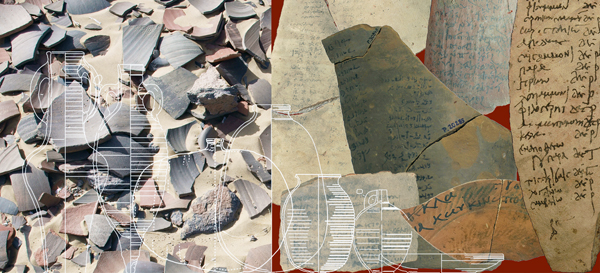


| MTK | Onlinepublication | A09 | Collaborative Research Centre 933 of the German Research Foundation. Material Text Cultures. Materiality and Presence of Writing in Non-Typographic Societies |
 |
|
Heidelberg Ostraca Project – HOP |
|
Subproject |
|
Teilprojekt A09
of the CRC 933 |
Writing on Ostraca in the Inner and Outer Mediterranean |
Members |
|
Description InstitutionHeidelberg University: Zentrum für Altertumswissenschaften (ZAW) - Seminar for Ancient History and Epigraphy KeywordsOstraca, Practice, Materiality, Texts, Mediterranean |
The Heidelberg Ostraca Project (HOP) aims to collect and make available information on material aspects of ostraca, that is, pottery sherds used as writing material, in the area of the ancient Mediterranean. While the main scientific contribution of the Heidelberg team lies in describing and analyzing physical characteristics of the potsherds, such as the type of ceramic fabric and the vessel from which it originated, integration of this data with information pertaining to the archaeological context as well as to the inscribed text will permit a more comprehensive approach to the study of ostraca and to the broader historical circumstances in which they were used. The core metadata for HOP is derived from the records in the Trismegistos Texts Database (Leuven). These contain a unique identifying number for the inscribed object, and a reference to its material, provenance, genre, language, and any relevant bibliography. This information, which is either taken over or linked to in the HOP records, is supplemented by ceramological descriptions and archaeological data, when available. Since information regarding the physical and contextual properties of ostraca may vary greatly depending on whether they come from recent excavations or from earlier acquisitions, which often lack detailed information, HOP has the built-in flexibility to record and account for these differences in the analysis of the material. HOP Databank is a work in progress. The bulk of the current information (2341 records) derives from the analysis of the ostraca in such collections as the Papyrussammlung Heidelberg - Institut für Papyrologie, Ägyptisches Museum und Papyrussammlung in Berlin, Louvre Museum in Paris, as well as from the excavations at Soknopaiou Nesos/Dime (Fayoum) and Trimithis/Amheida (Dakhla Oasis). If you have a question about the online catalogue, please contact us. |
Contact |
Universität Heidelberg - Zentrum für Altertumswissenschaften - ZAW Telefon: +49-(0)6221-54-3555 Telefon: +49-(0)6221-54-3379 |
Conditions of use |
|
Research Funding |
|